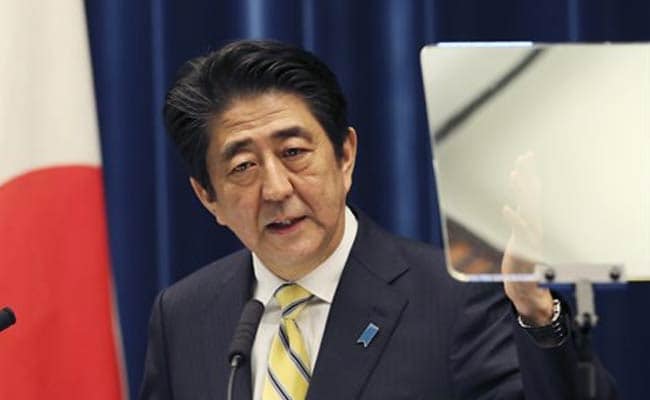
File Photo: Japanese Prime Minister Shinzo Abe. (AP Photo)
Tokyo:
Japanese Prime Minister Shinzo Abe sent a ritual offering on Tuesday to a controversial Tokyo shrine for war dead, a senior spokesman said, a day before he hopes to meet Chinese President Xi Jinping on the sidelines of a leaders' summit in Jakarta.
Abe sent an evergreen shrub in honour of Japan's war dead, a gesture likely to anger China, though the timing of the offering - a day before it is traditionally made - was seen as an attempt to avoid a diplomatic embarrassment at Wednesday's summit.
Sino-Japanese ties have chilled in recent years due to feuds over Japan's wartime history, bitter memories of which persist in China, as well as territorial rows and mutual mistrust over Abe's bolder security policies and China's military assertiveness.
Relations thawed a little after Abe met Xi for a rare summit in Beijing late last year. Abe is expected to make brief remarks at the Asian-African summit in Jakarta on Wednesday, comments that will be closely watched for his stance on Japan's wartime aggression amid concerns he wants to tone down past apologies.
Abe's remarks on history could provide insight into whether the cautious rapprochement between Japan and China continues.
His offering at Tokyo's Yasukuni shrine, where convicted war criminals are honoured along with other war dead, is part of Abe's efforts to tread a fine line between satisfying conservative allies who want him to visit the shrine in person and a desire to keep the rapprochement with Beijing on track.
Abe had been expected to make the offering on Wednesday, when scores of lawmakers are set to pay their respects at the shrine on the date of Yasukuni's spring festival. Many in China and South Korea see it as a symbol of Japan's past militarism.
"Certainly ... China will perceive a mixed message no matter what he says about it being a private gesture," Jeffrey Kingston, director of Asian studies at Temple University's Japan campus, said of the offering.
"From China's perspective it will be problematic ... but Abe can say enough (in Jakarta) to get a meeting with Xi Jinping."
A Japanese government source said Abe would express remorse over World War Two war in his remarks but media have said he would not emulate his predecessor, Junichiro Koizumi, who in 2005 repeated a landmark apology at the shrine.
Abe will make a high-profile speech to a joint session of the U.S. Congress next week, the first by a Japanese leader, where he will stress that former enemies the United States and Japan are now the closest of allies, the Japanese source said.
Both the Jakarta remarks and the U.S. speech will provide hints to a statement Abe plans to make in August to mark the 70th anniversary of the end of World War Two.
Abe sent an evergreen shrub in honour of Japan's war dead, a gesture likely to anger China, though the timing of the offering - a day before it is traditionally made - was seen as an attempt to avoid a diplomatic embarrassment at Wednesday's summit.
Sino-Japanese ties have chilled in recent years due to feuds over Japan's wartime history, bitter memories of which persist in China, as well as territorial rows and mutual mistrust over Abe's bolder security policies and China's military assertiveness.
Relations thawed a little after Abe met Xi for a rare summit in Beijing late last year. Abe is expected to make brief remarks at the Asian-African summit in Jakarta on Wednesday, comments that will be closely watched for his stance on Japan's wartime aggression amid concerns he wants to tone down past apologies.
Abe's remarks on history could provide insight into whether the cautious rapprochement between Japan and China continues.
His offering at Tokyo's Yasukuni shrine, where convicted war criminals are honoured along with other war dead, is part of Abe's efforts to tread a fine line between satisfying conservative allies who want him to visit the shrine in person and a desire to keep the rapprochement with Beijing on track.
Abe had been expected to make the offering on Wednesday, when scores of lawmakers are set to pay their respects at the shrine on the date of Yasukuni's spring festival. Many in China and South Korea see it as a symbol of Japan's past militarism.
"Certainly ... China will perceive a mixed message no matter what he says about it being a private gesture," Jeffrey Kingston, director of Asian studies at Temple University's Japan campus, said of the offering.
"From China's perspective it will be problematic ... but Abe can say enough (in Jakarta) to get a meeting with Xi Jinping."
A Japanese government source said Abe would express remorse over World War Two war in his remarks but media have said he would not emulate his predecessor, Junichiro Koizumi, who in 2005 repeated a landmark apology at the shrine.
Abe will make a high-profile speech to a joint session of the U.S. Congress next week, the first by a Japanese leader, where he will stress that former enemies the United States and Japan are now the closest of allies, the Japanese source said.
Both the Jakarta remarks and the U.S. speech will provide hints to a statement Abe plans to make in August to mark the 70th anniversary of the end of World War Two.
© Thomson Reuters 2015
Track Latest News Live on NDTV.com and get news updates from India and around the world

